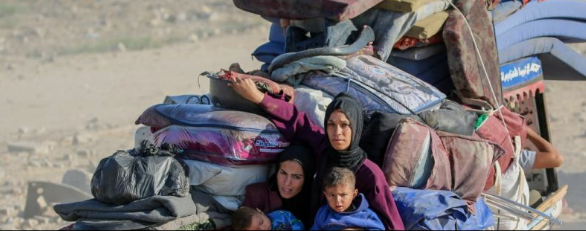In the wake of the Gaza ceasefire, a poignant scene has unfolded — more than half a million Palestinians have returned to their devastated homeland. By Saturday evening, Gaza’s civil defense agency confirmed that the flow of displaced residents back into the Strip had surpassed 500,000, many finding nothing but rubble where their homes once stood.
The return follows indirect negotiations in Cairo, where Israel and Hamas agreed on the first phase of a ceasefire on October 9. The agreement includes the release of prisoners and the facilitation of humanitarian aid — part of a 20-point peace plan proposed by U.S. President Donald Trump.
According to AFP, tens of thousands poured into the ravaged streets of Gaza City as Hamas prepared for the release of Israeli captives. The civil defense agency reported that more than half a million people had already crossed back into the enclave.
Among them was Mahmoud al-Shandughli, who told AP,
“Gaza is completely destroyed. I have no idea where to stay or where to go.”
As bulldozers cleared the wreckage of two years of conflict, a young boy climbed atop the rubble to raise the Palestinian flag — a symbol of resilience amid devastation.
Meanwhile, AP reported that around 200 U.S. troops have arrived in Israel to monitor the ceasefire, establish a coordination center, and assist with logistics and humanitarian deliveries.
Under Trump’s Gaza peace framework, as Israeli forces gradually withdraw from the Strip, a multinational force consisting of Egypt, Qatar, Turkey, and the United Arab Emirates will assume responsibility. Coordination will be managed through a U.S.-led command center based in Israel.
Admiral Brad Cooper, head of U.S. Central Command, stated:
“This major effort will take place without deploying American ground troops inside Gaza.”
Egypt’s presidential office announced that Donald Trump will chair a high-level summit in Sharm el-Sheikh on Monday, bringing together leaders from more than 20 countries to discuss Gaza and the broader Middle East.
However, in an interview with AFP in Doha, Hamas political bureau member Hussam Badran warned that the plan’s second phase “faces numerous challenges and complications.” He confirmed that Hamas will not attend the formal signing ceremony of the peace agreement in Cairo.
Another Hamas official, speaking on condition of anonymity, told AFP:
“Laying down our weapons is out of the question.”



